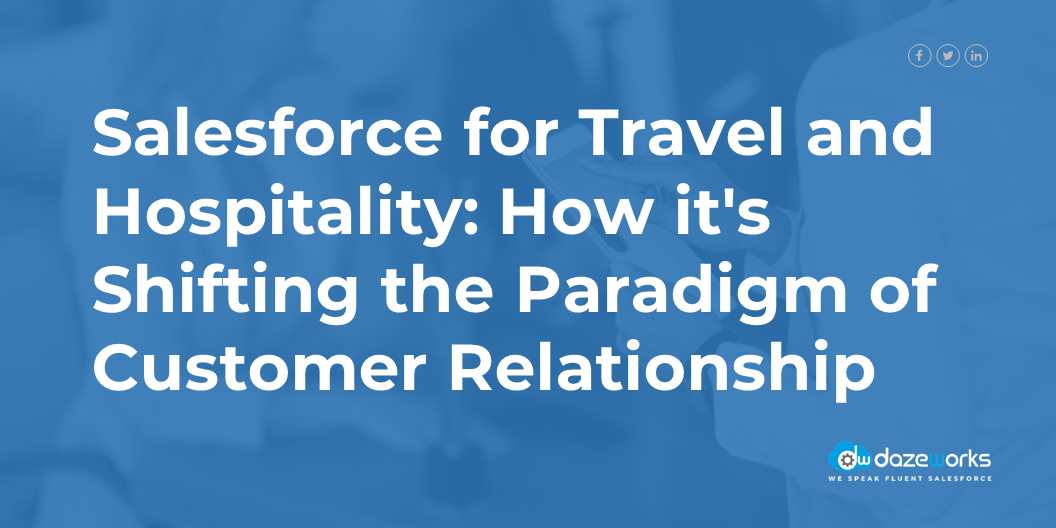
Salesforce for Travel and Hospitality – How it is Shifting the Paradigm of Customer Relationship
minutes read
With people’s willingness to travel and spend more, travel and hospitality industry has their biggest earing opportunity during the holiday season. 44% of Americans are likely to take leisure holiday trips this year during the upcoming holidays. This means that travel and hospitality must bring in the customer services to boost their revenue. This is where Salesforce’s ability to centralize customer data, interactions, and feedback plays a pivotal role. In this blog, we will take a deeper dive into understanding the prominence of Salesforce in the travel and hospitality industry.

The Impact of Salesforce on Customer Experiences
Personalized touchpoints facilitated by Salesforce contribute to a seamless and cohesive customer journey, from the initial inspiration phase to post-trip engagement. By leveraging the platform’s capabilities, travel and hospitality businesses can craft targeted marketing campaigns that speak directly to the interests and preferences of their customers, resulting in higher engagement and conversion rates.
Furthermore, Salesforce’s impact extends to post-booking interactions, where businesses can continue to nurture customer relationships by providing relevant and timely updates, recommendations, and support throughout the travel experience. Salesforce enables businesses to transcend standard service levels and deliver moments of delight and genuine connection.
Leveraging Salesforce for Personalized Customer Interactions
The ability to deliver personalized customer interactions is a cornerstone of success in the travel and hospitality industry. Through the Salesforce platform’s robust capabilities in customer data management and segmentation, businesses can create detailed customer profiles that capture preferences, past interactions, and feedback. This rich repository of information forms the basis for crafting tailored experiences that resonate with each customer, from personalized recommendations to targeted promotional offers.
Salesforce’s marketing automation features further enable businesses to deploy personalized communication strategies, delivering the right message to the right customer at the right time. By leveraging data-driven insights, businesses can orchestrate customer journeys that are highly relevant and engaging, fostering a sense of individuality and exclusivity. The result is a shift from generic, mass-market communications to tailored interactions that resonate with customers on a personal level, fostering a sense of connection and relevance.
Integrating Salesforce with Booking and Reservation Systems
One of the key areas where Salesforce has made a substantial impact in the travel and hospitality industry is in the integration of booking and reservation systems. By seamlessly connecting Salesforce with these vital systems, businesses can streamline the entire customer journey, from initial inquiry to post-trip follow-up. This integration enables businesses to centralize customer data and booking information, providing a comprehensive view of each customer’s interactions and preferences.
The integration also facilitates enhanced collaboration between sales, marketing, and customer service teams, ensuring a cohesive approach to customer interactions. With a unified view of customer data, teams can deliver personalized recommendations, offer timely assistance, and seamlessly coordinate pre- and post-trip communication. Furthermore, the integration with booking and reservation systems enables businesses to automate processes such as booking confirmations, itinerary updates, and post-trip surveys, enhancing operational efficiency and customer satisfaction.
Streamlining Marketing and Sales Efforts with Salesforce
Marketing and sales efforts are integral components of a successful travel and hospitality business. Salesforce offers a suite of tools and features designed to streamline these critical functions. The platform’s marketing automation capabilities enable businesses to create targeted campaigns, personalized communications, and automated workflows that resonate with individual customers. By leveraging customer data and insights, businesses can craft highly relevant and engaging marketing initiatives, driving higher levels of engagement and conversion.
Furthermore, Salesforce’s sales management tools empower businesses to track customer interactions, manage leads, and optimize the sales pipeline for improved conversion rates. The platform provides sales teams with a unified view of customer data, enabling them to tailor their approach to each customer and deliver a personalized sales experience. With features such as lead scoring, opportunity tracking, and predictive analytics, Salesforce equips businesses with the resources necessary to drive sales efficiency and effectiveness.
Conclusion
Salesforce is not just a tool but a catalyst for transformation within the travel and hospitality industry, enabling businesses to redefine customer experiences and elevate their offerings to new heights. As the industry continues to embrace digital innovation and customer-centric strategies, Salesforce stands poised to play a pivotal role in shaping the future of travel and hospitality, driving sustained growth and differentiation for businesses that embrace its potential.
